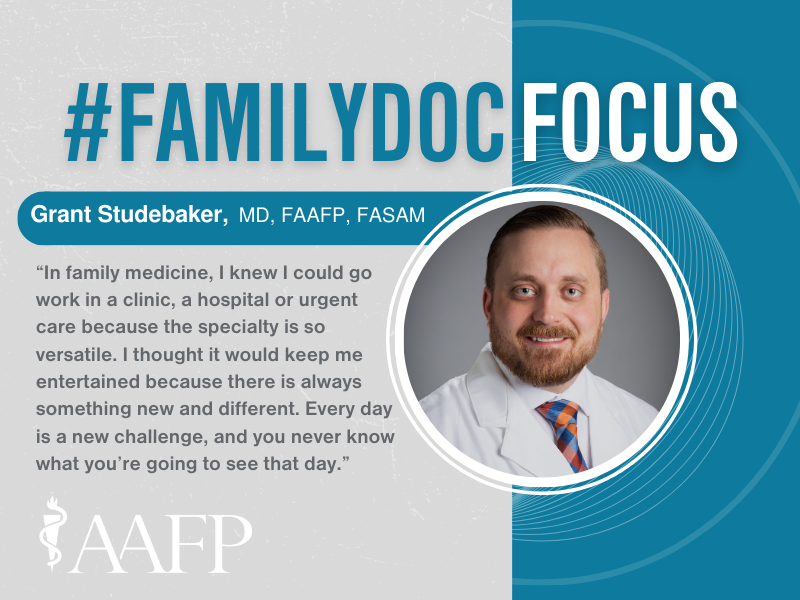Finding Balance in Family, Medicine
June 13, 2024, David Mitchell — Grant Studebaker, M.D., FAAFP, FASAM, is the program director and an assistant professor of family medicine at the University of Tennessee Health Science Center in Jackson, but his work extends well beyond those roles.

Studebaker also serves as an attending physician at an acute detox center and the medical director for several clinics, including an addiction treatment center. Additionally, he is the vice speaker of the Tennessee AFP, sits on multiple committees for West Tennessee Healthcare, and is vice chair of its advisory board. His leadership roles also include serving on committees and task forces for the Association of Family Medicine Residency Directors, his state chapter, the Tennessee Department of Health, his university and his residency program.
He is president of a foundation that provides free, long-acting reversible contraception to women in West Tennessee and he also works as a ringside physician for USA Boxing.
Beyond his professional responsibilities, Studebaker enjoys coaching basketball and softball teams for his three children.
“One of the things that really attracted me to come here as a resident, and then to stay here as faculty and now program director, is that we really do value the relationship with home and how important that is to also be successful in your work,” said Studebaker, whose wife is a nurse. “We do everything we can to make the schedule work and help cover so we can be at our kids’ games or be off for your anniversary or whatever it may be. That has been part of the culture here for a long time, and that’s something we want to share and make sure people know that this can be done. You can have a busy practice and not have to just work nonstop.”
Studebaker, along with three other family physicians from the UT Health Science Center in Jackson, will present a session on work-life balance at the National Conference of Family Medicine Residents and Medical Students, Aug. 1-3 in Kansas City, Mo. Joining him will be department chair Gregg Mitchell, M.D.; clinic director Brandon Churchill, M.D.; and Renee Hubbard, D.O., who will become one of the program’s chief residents in July.
“The session will be presented by family physicians who are at different stages in their careers so students and residents can get varying perspectives on practice, what it could look like and how people manage that during various stages of their life,” Studebaker said. “One of the things we point out is how much stuff we do outside of our practice. We still have time to do all the things we want to do and be involved with all our kids’ activities because family medicine can lend itself to being flexible. Not only that, but it offers a wide variety of practice locations and modalities so you can tailor your practice and be involved in the things you want to do at home.”
Studebaker earned his emergency medical technician license during his senior year of high school and worked as an EMT for seven years. However, the flexibility of family medicine drew him to primary care.
“It was a great way to get experience in the medical field, develop some skills and have a good job during college,” he said. “I worked on an ambulance and loved it, but I didn’t want to just do emergency medicine. Burnout in that field is high, so what am I going to do if I get tired of the ER? In family medicine, I knew I could go work in a clinic, a hospital or urgent care because the specialty is so versatile. I thought it would keep me entertained because there is always something new and different. Every day is a new challenge, and you never know what you’re going to see that day.”
Studebaker’s family medicine program is the only residency in a large hospital system, covering its clinic, the hospital, ICU, pediatrics, and the labor-and-delivery unit.
“Part of the responsibility here as a resident is to teach those who are behind you,” he said. “As a second year, you’re helping teach the interns and during third year you’re helping run the service and teaching the medical students. I really fell in love with teaching, so as soon as I graduated, I joined the faculty and have been here ever since.”
Since arriving as an intern in 2013, Studebaker has seen the residency grow from eight residents per year to 12. Last year, the program added a rural training track, which will add two more residents per class. Residents in the rural track spend one year in Jackson and two years in Martin.
“We have the highest retention rate of any residency program in the state of Tennessee, meaning more of our graduates stay in Tennessee than any program across the state,” he said. “That’s one thing we’ve been really proud of, to train good doctors and also keep them here in Tennessee.”